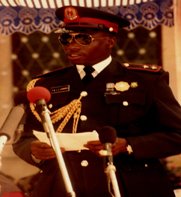By Mr. Jadama Sadibu (Stockholm Sweden)
Journalist/ Media consultant
 The scourge of tribalism which is creeping into the politics of Gambia today should cause headaches for all well meaning Gambians. As citizens of one nation one would have thought that we have seen enough of what tribal politics can do to a nation. Most of us are living witnesses to the carnage that went on in Rwanda, Liberia, Sierra-Leone and Somalia, and presently in the Casamance region of Senegal. These countries all fell into the abyss due to tribalism and ethnics. I believe that the Gambia is highly enlightened not to descend that low but our history shows that things that happen in other countries can also happen in The Gambia. Military coup d'etats which started in Togo and Congo spread through Africa like a tsunami and we got our share in 1994 .And that is why it is expedient that we safeguard our dear country against any attempt to inject tribalism into our infant democracy.
The scourge of tribalism which is creeping into the politics of Gambia today should cause headaches for all well meaning Gambians. As citizens of one nation one would have thought that we have seen enough of what tribal politics can do to a nation. Most of us are living witnesses to the carnage that went on in Rwanda, Liberia, Sierra-Leone and Somalia, and presently in the Casamance region of Senegal. These countries all fell into the abyss due to tribalism and ethnics. I believe that the Gambia is highly enlightened not to descend that low but our history shows that things that happen in other countries can also happen in The Gambia. Military coup d'etats which started in Togo and Congo spread through Africa like a tsunami and we got our share in 1994 .And that is why it is expedient that we safeguard our dear country against any attempt to inject tribalism into our infant democracy.
The question one is tempted to ask is what is tribalism? What are the reasons behind why some people feel so strong about the superiority of their tribes over others? Why do learned people who should know better also engage in this uncivilized tradition? It is the hope of this essay to examine these questions.
Most English dictionaries define tribalism (among other definitions) as the exaltation of ones tribe above others. In other words tribalism is the feeling that ones tribe is superior to some other tribe or all tribes. As a result the tribalism has a disdain and often disrespect for the tribes they think are inferior to their tribe. Such people therefore discourage association in any form be it marriage, work, or friendship with tribes they deem to be inferior. In most cases they have derogatory names for the tribes they deem to be inferior. In The Gambia almost every tribe has such names for other tribes.. The reasons for tribalism and tribal discrimination may include the following:
The first reason is history. Many a tribalist traces the superiority of their tribes to history. They will recount how their fore bearers defeated the other tribes in a war or a series of wars. They will recount how their fore bearers enslaved the other tribes. Such people take pride on their history and no amount of persuasion can persuade them to see today’s reality. They believe that since their ancestors were "better" than the other tribes so also are they now. Linked to the above is indoctrination. In most homes children are taught to discriminate against people from tribes their parents feel are inferior. Such parents will continuously bombard their children with the virtues of their tribes and the vices of the so-called inferior or despised tribes. Some parents’ persistently warn their kids not to take friends from some tribes. Children who grow up with such training turn to be adult tribalists. Another reason for tribalism is geographical location in relation to national resources and power. By this I mean that tribes which are endowed with resources and jobs often tend to disrespects people from other tribes who come to seek work on their land. Similarly tribes which have the seat of power tend to think that they are better than the other tribes and sometimes look down upon them. The foregoing has been aggravated by politics. It is sad to say that most of our politicians either publicly or privately try to whip tribal sentiments for their own political purposes. They try to concoct stories that will infuriate one tribe or the other so that they may not vote for certain parties. Scavengers as they are, these corrupt politicians know that they have nothing better to offer when it comes to issues of national development so by playing the tribal card they are able to skip the issues at stake. They fail to recognize that their actions cause more harm to the very state they want to govern. Perhaps one will be able to forgive these politicians a little if one considers the fact that politicians are like vultures who feed on people’s vulnerabilities.
However one cannot forgive journalists who engage in tribalism. It is the most worrying trend in politics of The Gambia today. The media which is the objective fourth arm of government is supposed to be an objective observer of politicians and put them on their toes. The media is the ear of society and its work imparts greatly on the national psyche. The media's objective reportage of the news helps the electorate to know the going on in the government and the realms of politics. Therefore it just so sad that some of our journalists have thrown good journalism and have chosen to join the tribal bandwagon. It is a pity that our journalists have not learnt from Rwanda and other nations who went down the drain because of their engagement in senseless tribal journalism. There is no justification for a journalist to engage in tribalism and our journalists who have chosen that cause shown bow their heads in shame and desist from the practice.
The negative effects of tribalism in the Gambia are not far fetched. First of all tribalism breeds nepotism. Once people feel that their tribesmen are better than people from other tribes they tend to surround themselves with their tribesmen when get into positions of trust. The tribalists are willing to hire people from their tribe who may not otherwise be the best candidate for the given job. Such actions deprive the nation of the right people for the right job.
Secondly tribalism affects national cohesion. To the tribalists their allegiance is first to their tribe before the nation. They do not see themselves as Gambians but as a member of tribe A or B. Therefore they do not look for ways that can benefit the whole nation but rather they look for ways that will strengthen their tribes at the expense of the nation. And this does not bode well for the nation. To some extent they try as much as possible to create hegemony when they have power or are put in a position of trust. Also petty tribal conflicts divert national attention and resources. The amount of money and personnel that are used to quell such could have been used for other pressing and important needs. Above all tribalism can be a prelude to national crisis, the result of which will be disastrous as have been sited elsewhere in this paper.
How then can we stem the scourge of tribalism? First of all, the ministry of information and national orientation should make fighting tribalism one of its major priorities and device means to fight it. They can device radio and TV programmers that will let people see those as Gambians first. They can also device programs that will tout our common identity and what brings us together as a people of one Gambia.
Secondly, our educators and policy makers should incorporate subjects that will teach our young ones the need to respect one another in the school curriculum Since the seed of tribalism is sowed in the kids at very tender age, it equally important that our educational system cultivate a sense of one’s and nationhood in our kids. Our schools colleges and universities should also discourage the formation of tribal based associations. These associations which are recipe for tribalism could give way to regional associations which embraces all people from the particular region. Our Alkalos, chiefs and traditional leaders should also be utilized to help fight the scourge of tribalism. Since our chiefs are the so-called custodians of our culture, the onus lies on them to teach their subjects about our common ancestry. They should try and eschew tribal pride a little and embrace other tribes in their functions and also encourage inter- tribal marriages and associations.
On the individual level we should all do well to see people we meet as individuals and not as a microcosm of their tribe. The fact you met one uneducated Mandingo or Fula does not mean all are uneducated. The fact that you one Njago stole a goat does not mean all Njagoess are thieves. (Please, this is just by way of examples). There are good and bad people in every race, tribe or family.
We owe it as a duty to leave a peaceful Gambia to our children just as we inherited it. All the tribes in the Gambia have more things in common than things that divide us. Finally, I could not help but to recognize the importance of peaceful tribal co-existence. In the end we must all pray that our mother Gambia will continue to be a safe secure haven for all. GOD BLESSES the Gambia.



No comments:
Post a Comment